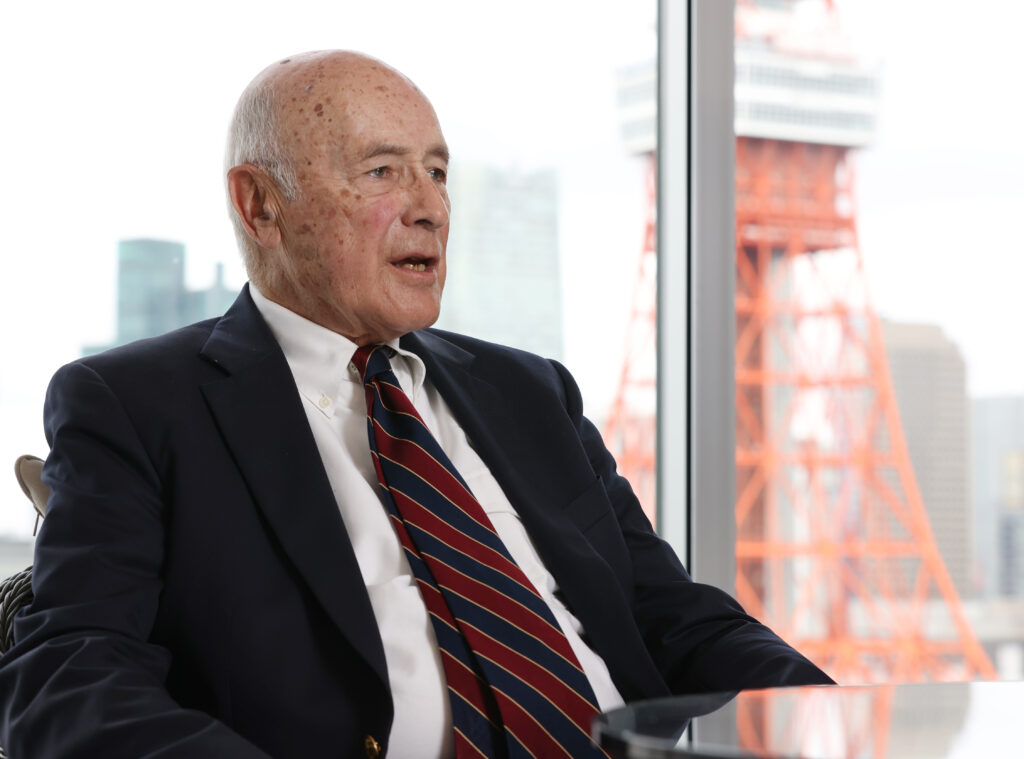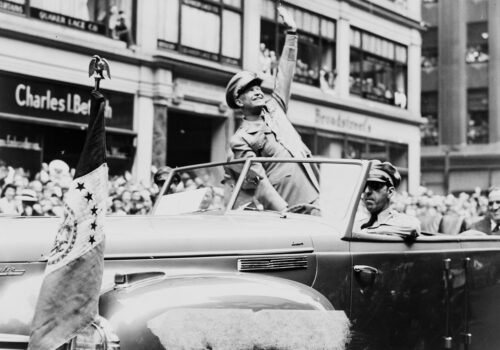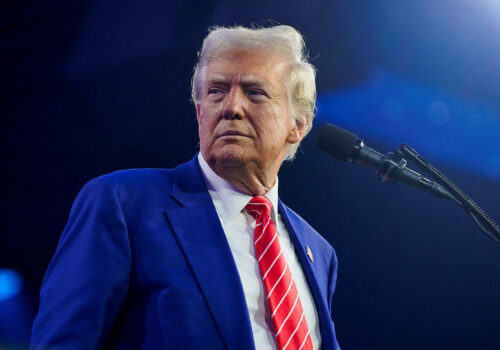Joseph S. Nye Jr., the public servant and professor who coined the term “soft power” to describe US cultural influence around the globe, died on May 6. Nye served on the Atlantic Council’s board of directors from 2014 until his passing. He was an active contributor to the Atlantic Council’s work, including an essay for our New Atlanticist section in August drawing from his memoir, A Life in the American Century. He concluded the article by striking an optimistic note:
- “Some historians have compared the flux of ideas and connections today to the turmoil of the Renaissance and Reformation five centuries ago, but on a much larger scale. And those eras were followed by the Thirty Years’ War, which killed a third of the population of Germany. Today, the world is richer and riskier than ever before.
- I am sometimes asked whether I am optimistic or pessimistic about the future of the United States. I reply, ‘Guardedly optimistic.’ The United States has many problems—polarization, inequality, loss of trust, mass shootings, deaths of despair from drugs and suicide—just to name a few that make headlines. There is a case for pessimism. At the same time, we Americans have survived worse periods in the 1890s, 1930s, and 1960s. For all its flaws, the United States is an innovative and resilient society that, in the past, has been able to recreate and reinvent itself. Maybe Generation Z can do it again. I hope so.”
Below, members of the Atlantic Council community reflect on the impact Nye made on both our work and the wider world.
Click below to jump to an expert reflection:
Matthew Kroenig: “In a dangerous and turbulent time in global affairs, he remained an optimist”
Chuck Hagel: “He brought clarity to so many complicated issues”
Jan Lodal: He “changed our language to better communicate important diplomatic concepts”
Paula Dobriansky: “His policy advice and brilliant ideas will endure”
“In a dangerous and turbulent time in global affairs, he remained an optimist”
Just recently, our CEO Fred Kempe applied the “Joe Nye rule” as a guide to the Atlantic Council’s geostrategy work. He advised that our regular, private Strategy Consortium convenings bring together the caliber of strategic thinkers who will entice people like Joe Nye to remain engaged.
We are deeply saddened to learn of Nye’s passing and that his participation in our convenings will no longer be possible. He was a longstanding Atlantic Council board director and a regular participant in our private Strategy Consortium meetings for many years, most recently in December 2024 on the topic of anticipating a future Trump administration national security strategy. He also contributed to our strategy work in other ways, authoring forwards for our Atlantic Council Strategy Papers series and articles for our website.
He was a towering intellect and a resolute and courteous commentator on global affairs. He brought penetrating insights to our meetings and did not shy away from expressing disagreement, but always in a generous way, intending only to elevate the discussion and improve the quality of the work.
In a dangerous and turbulent time in global affairs, he remained an optimist about American power, alliances, and global engagement. Even though he is no longer with us, Nye’s strategic clarity, civility, and optimism will continue to inspire the Atlantic Council.
—Matthew Kroenig is vice president and senior director of the Atlantic Council’s Scowcroft Center for Strategy and Security and the Council’s director of studies.
“He brought clarity to so many complicated issues”
We have lost an exceptional human being. He brought clarity to so many complicated issues over the years. We all learned from him and benefitted from his wisdom and knowledge and unpretentious style. He’ll be missed by many.
—Chuck Hagel is a member of the Atlantic Council international advisory board, a former US secretary of defense, and a former US senator from Nebraska.
He “changed our language to better communicate important diplomatic concepts”
Joe’s contributions to his students, his family, and world peace and security were unparalleled. His impact will be felt indefinitely.
Joe was also a magnificent personal friend and colleague. We survived numerous hikes to the top of the mountains in Aspen after the exhilarating discussions he had organized for the Aspen Strategy Group. He asked me to take over the group when he had to step down, which I was honored to do. I then imposed on him to join my team as assistant secretary for international security affairs under Bill Perry in the Clinton administration. He was the best ever in that storied office.
Joe actually changed our language to better communicate important diplomatic concepts—”soft power” being perhaps the most memorable. He was a devoted husband to his dear wife, Molly, and a great art dealer from whom we obtained twelve paintings that grace our walls and remind us daily of Joe. We will miss him greatly.
—Jan Lodal is a distinguished fellow at the Atlantic Council, a former principal deputy under secretary of defense for policy, and a former senior staff member of the National Security Council.
“His policy advice and brilliant ideas will endure”
Joe Nye was an extraordinary scholar, intellect, professor, and public servant. He was a prolific writer whose books, articles, and op-eds advanced innovative ideas and provided cogent analyses of complex national security issues. Described as a “towering figure in international affairs,” he produced writings that have had a profound impact on policymakers both at home and abroad. He was widely known for having conceived the “soft power” approach in US foreign policy, which promotes American power through influence, persuasion, and diplomacy.
Joe’s service at the Pentagon as assistant secretary of defense for international security affairs and as chair of the National Intelligence Council was distinguished and results-driven. During his tenure at the State Department as deputy to the under secretary for security assistance, science, and technology, he chaired the consequential National Security Council interagency group on nonproliferation of nuclear weapons.
I have long admired Joe’s achievements in foreign policy and public service. On a more personal level, I was also proud to have been his colleague and friend. He touched my life in so many ways. While at Harvard for my master’s and Ph.D. degrees, Joe was not only my professor there, but a wonderful mentor. One of his many admirable qualities that I loved was his desire to have a good lively policy debate. He always brought opposing points of view into a discussion and relished a vibrant exchange of opinions. His calm demeanor in the midst of bureaucratic squabbles or crises was exemplary.
I will miss him terribly, but I am gratified that his policy advice and brilliant ideas will endure. He was indeed a giant in international affairs and leaves a remarkable legacy.
—Paula J. Dobriansky is the vice chair of the Scowcroft Center for Strategy and Security and a former US under secretary of state for global affairs.
“He acted and advocated in the best American tradition of wanting to apply US might in the service of right”
Joe Nye was the rare combination of government foreign policy practitioner with political thinker and public scholar of the first order. He has been called a “neo-liberal.” But that term, like its twin “neo-conservative,” is more of an epithet than a useful guide. Roughly put, Nye believed that the rules-based international system that the United States created and led for three generations after World War II was a good thing—that it had more potential to generate prosperity, avoid world war, and advance American values and thus American interests than the competition. Because the competition in the twentieth century was fascism and communism, Nye’s judgment was a sure thing.
But Nye’s optimistic view now seems eclipsed by the dark neo-nationalism espoused by many in the United States and indeed across Europe. When some in the Trump administration, including US President Donald Trump, call for seizing Greenland, they seem to argue that only physical control of (and raw power over) territory can secure US interests, that there is no place for cooperation between nations to achieve goals that benefit both. That’s not a new view; it’s a mere repackaging of old European, great-power imperialism that brought disaster in its time and could bring disaster in ours. Such thinking would reduce the United States to a mere grasping, greedy superpower, a larger version of Vladimir Putin’s Russia, seeking to dominate through force and fear.
Nye’s views are now, more than ever, worth considering. He was no naif about the need for power in the international arena. But he acted and advocated in the best American tradition of wanting to apply US might in the service of right. When he spoke of such things, he meant it: artful, creative, committed, and realistic in the best sense. What a compelling and inspiring legacy he leaves behind.
—Daniel Fried is the Weiser family distinguished fellow at the Atlantic Council and a former US ambassador to Poland.
Further reading
Tue, Aug 20, 2024
Think the American century is over? Think again.
New Atlanticist By
The United States is an innovative and resilient society that, in the past, has been able to recreate and reinvent itself, writes Joseph S. Nye Jr.
Thu, May 8, 2025
The lesson of VE Day 80 years later: Discard the ‘false choice’ between US values and interests
Inflection Points By Frederick Kempe
This epoch has shown the United States at its best. Yet clinging to the status quo isn’t a policy designed for the future.
Thu, Jan 9, 2025
Land grabs, occupation, and threats will not make the US great again
New Atlanticist By Daniel Fried
The president elect’s threats may be bluster or tactical, but they reveal a dark side of power unworthy of any US president.
Image: Joseph Nye, an American political scientist, speaks during an interview conducted by Yomiuri Shimbun in Tokyo on Oct. 24, 2022. The Yomiuri Shimbun.



